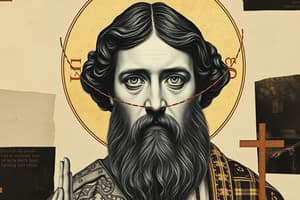Podcast
Questions and Answers
What is the primary belief of Plato regarding the structure of society?
What is the primary belief of Plato regarding the structure of society?
- Individuals should rely on emotions to determine justice.
- Justice is achieved when all powers work towards individual good. (correct)
- Society should be ruled by the strongest individuals.
- Human laws have no connection to natural laws.
According to Aristotle, which of the following is true about law?
According to Aristotle, which of the following is true about law?
- Law should be based only on human emotions.
- Law can instruct those ruled by passion to act morally. (correct)
- Law serves no moral purpose.
- Only the inherently good can grasp the importance of law.
What is the primary focus of jurisprudence?
What is the primary focus of jurisprudence?
- To create new laws for modern society
- To analyze and explain the nature and meaning of law (correct)
- To enforce laws and regulations
- To evaluate economic theories in relation to law
What does St. Thomas Aquinas identify as the source of human positive law?
What does St. Thomas Aquinas identify as the source of human positive law?
Which kind of law did St. Thomas Aquinas consider to be governed by God's ultimate authority?
Which kind of law did St. Thomas Aquinas consider to be governed by God's ultimate authority?
Which of the following statements about natural law is true?
Which of the following statements about natural law is true?
What is a significant aspect of Plato's view on education?
What is a significant aspect of Plato's view on education?
According to Socrates, what is essential for society to achieve true justice?
According to Socrates, what is essential for society to achieve true justice?
What distinguishes positive law from natural law?
What distinguishes positive law from natural law?
Which aspect does jurisprudence seek to understand about law?
Which aspect does jurisprudence seek to understand about law?
What characterizes Natural Law according to St. Thomas Aquinas?
What characterizes Natural Law according to St. Thomas Aquinas?
Under what condition are laws considered just?
Under what condition are laws considered just?
According to Positive Law theorists like Hobbes, what is the primary reason for obeying laws?
According to Positive Law theorists like Hobbes, what is the primary reason for obeying laws?
What is considered the ultimate authority over the state according to St. Thomas Aquinas?
What is considered the ultimate authority over the state according to St. Thomas Aquinas?
Which of the following best describes Hobbes' view of the natural state of humans?
Which of the following best describes Hobbes' view of the natural state of humans?
What does legal realism primarily focus on?
What does legal realism primarily focus on?
In the context of strict constructionism, how are legal cases typically ruled?
In the context of strict constructionism, how are legal cases typically ruled?
Marxism views law primarily as:
Marxism views law primarily as:
How does feminist jurisprudence conceptualize law in relation to women?
How does feminist jurisprudence conceptualize law in relation to women?
What is a key characteristic of the activist approach to legal rulings?
What is a key characteristic of the activist approach to legal rulings?
What does Thomas Hobbes believe about the natural state of humans?
What does Thomas Hobbes believe about the natural state of humans?
According to John Locke, what are the natural rights that individuals possess?
According to John Locke, what are the natural rights that individuals possess?
Jeremy Bentham is best known for which of the following concepts?
Jeremy Bentham is best known for which of the following concepts?
Which statement reflects John Austin's perspective on law?
Which statement reflects John Austin's perspective on law?
Legal realism emphasizes which of the following aspects?
Legal realism emphasizes which of the following aspects?
Flashcards
Eternal Law
Eternal Law
God's unchangeable laws that govern the universe.
Natural Law
Natural Law
Laws discoverable by reason and reflecting moral principles.
Human Positive Law
Human Positive Law
Laws created by humans for a society's smooth running.
Hobbes' natural state
Hobbes' natural state
Signup and view all the flashcards
Positive Law's reason for obedience
Positive Law's reason for obedience
Signup and view all the flashcards
Positive Law
Positive Law
Signup and view all the flashcards
Jurisprudence
Jurisprudence
Signup and view all the flashcards
Socrates' view of natural law
Socrates' view of natural law
Signup and view all the flashcards
Justice (Socrates)
Justice (Socrates)
Signup and view all the flashcards
Plato's view on justice
Plato's view on justice
Signup and view all the flashcards
Aristotle's view on law's role
Aristotle's view on law's role
Signup and view all the flashcards
St.Thomas Aquinas' Eternal Law
St.Thomas Aquinas' Eternal Law
Signup and view all the flashcards
St. Thomas Aquinas' Natural Law
St. Thomas Aquinas' Natural Law
Signup and view all the flashcards
Aquinas' view on state vs church
Aquinas' view on state vs church
Signup and view all the flashcards
Legal Realism
Legal Realism
Signup and view all the flashcards
Strict Constructionist Approach
Strict Constructionist Approach
Signup and view all the flashcards
Originalist Approach
Originalist Approach
Signup and view all the flashcards
Activist Judge
Activist Judge
Signup and view all the flashcards
Marxism and Law
Marxism and Law
Signup and view all the flashcards
Hobbes' view on human nature
Hobbes' view on human nature
Signup and view all the flashcards
Locke's natural rights
Locke's natural rights
Signup and view all the flashcards
Utilitarianism
Utilitarianism
Signup and view all the flashcards
Austin's view on law
Austin's view on law
Signup and view all the flashcards
Legal Realism's focus
Legal Realism's focus
Signup and view all the flashcards
Study Notes
St. Thomas Aquinas
- Christian Philosopher
- 4 kinds of law
- Eternal law: laws by which God created the universe (we don't understand it)
- Natural law: can be known by humans through reason
- Divine Positive law: law that has been revealed to us in the scriptures
- Human Positive law: made by humans for the smooth running of the state
- People should live on earth in a way that would unite us with God
- State is not the ultimate authority, but rather the church is since it is in charge of spiritual needs
- State must be subordinate to the church
- People are under no obligation to follow an unjust law
- Laws are just if...
- It is a product of human reason (natural law)
- It is made for the common good
- It is published so that everyone knows it
Positive Law Theorists (Hobbes, Locke, Bentham, Austin)
- During 16 and 17 century in England, Life was pretty bad
- People started questioning the idea of natural laws. Where were they?
- People started believing that the laws were only put in place to insure the survival of the state
- No moral purpose
- Obedience was no longer a matter of conscience, but fear of penalties
- Why obey laws?
- The fear of getting caught (positive law)
- Morals, guilty (natural law)
- Betterment of society (Plato/Aristotle)
- Religious reasons (STA)
Thomas Hobbes (1588 - 1679)
- Natural state of humans was perpetual war (disproves of natural law)
- People constantly trying to strengthen their position
- We agree to surrender rights to leaders (government) to rule and maintain order
Studying That Suits You
Use AI to generate personalized quizzes and flashcards to suit your learning preferences.




